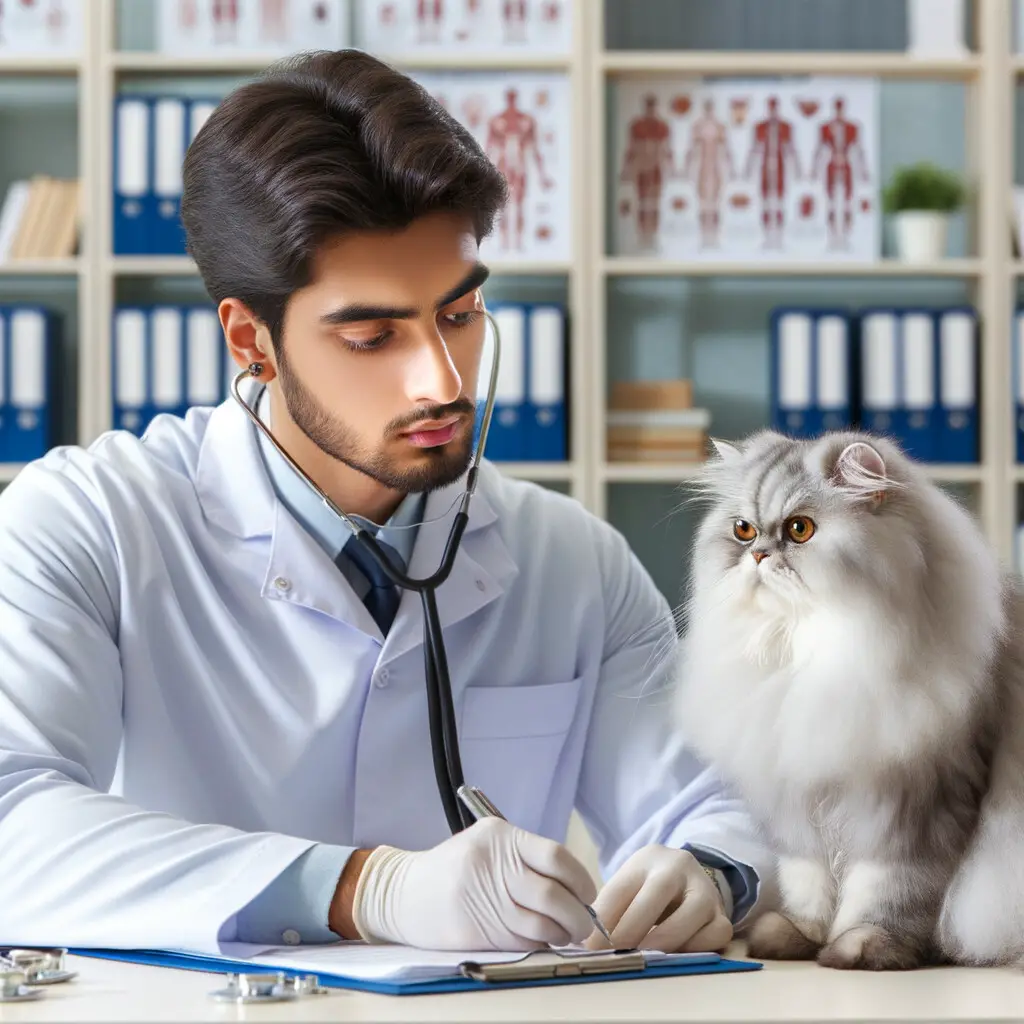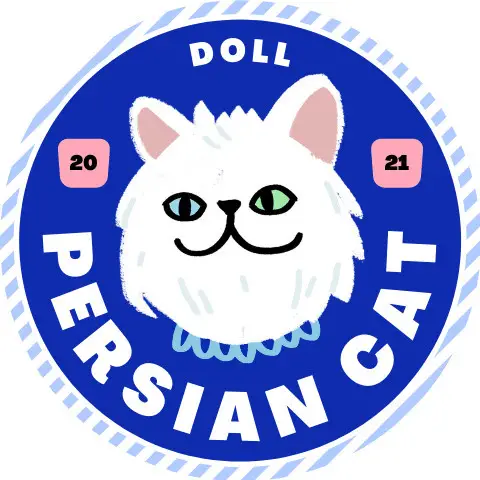
Introduction: Choosing a Cat Vet for Your Persian Purr Machine
Welcome to our comprehensive guide on finding the perfect vet for your Persian cat. We understand that your feline friend isn’t just a pet, but a cherished member of your family. Therefore, it’s crucial to find a vet who not only understands their unique health needs but also treats them with the love and care they deserve.
- Importance of finding the right vet for your Persian cat
- Understanding your Persian cat’s unique health needs
Finding the right vet for your Persian cat is not a task to be taken lightly. The health and well-being of your cat depend on the quality of veterinary care they receive. A good vet can detect health issues early, provide necessary treatments, and offer advice to keep your cat healthy. Moreover, Persian cats have specific health needs that require a vet with specialized knowledge and experience.
Persian cats are known for their luxurious coats and expressive eyes, but these beautiful features also come with unique health needs. For instance, their long hair requires regular grooming to prevent matting and skin issues. Their brachycephalic (short-nosed) faces can lead to respiratory problems. Additionally, Persian cats are prone to certain genetic conditions like Polycystic Kidney Disease (PKD). Understanding these unique health needs is crucial in providing the best care for your Persian cat.
In the following sections, we will delve deeper into the world of Persian cat health care, helping you make informed decisions about choosing the best vet. Whether you’re a new Persian cat owner or an experienced one, this guide will provide valuable insights to ensure your Persian Purr Machine lives a long, healthy, and happy life.
Understanding Persian Cat Health Care
When it comes to the health of your Persian cat, understanding their unique needs is crucial. Persian cats, while known for their beauty and charm, are also known for certain health issues that are unique to their breed. Let’s delve into these health issues and the special care needed for Persian cats.
Persian Cat Health Issues
- Common health issues in Persian cats
- Polycystic Kidney Disease (PKD): This is a genetic condition that causes cysts to form in the kidneys. According to Wikipedia, over a third of Persian cats are affected by PKD.
- Brachycephalic Respiratory Syndrome: This condition is common in flat-faced breeds like the Persian. It can lead to breathing difficulties and other respiratory issues.
- Progressive Retinal Atrophy (PRA): This is a degenerative eye disease that can lead to blindness.
- Special care needed for Persian cats
- Regular Grooming: Due to their long, thick fur, Persian cats require regular grooming to prevent matting and hairballs.
- Dietary Considerations: Persian cats may require a special diet to maintain their health and manage breed-specific issues like PKD.
- Regular Vet Check-ups: Regular vet visits are crucial to monitor for any potential health issues and ensure that your Persian cat is in the best possible health.
Persian cats are prone to a variety of health issues due to their distinct physical characteristics. These include:
Persian cats require special care to maintain their health and well-being. Here are some key points to consider:
Understanding the health issues common to Persian cats and the special care they require can help ensure that your feline friend lives a long, healthy, and happy life. Always consult with a vet who is familiar with the breed for the best advice on Persian cat health care.
Persian Cat Healthcare Guide
Ensuring the health and wellbeing of your Persian cat is a crucial responsibility as a pet owner. Here are three fundamental aspects to consider:
- Regular Check-ups
- Proper Nutrition
- Exercise and Mental Stimulation
Regular veterinary check-ups are essential for your Persian cat’s health. These check-ups help detect any potential health issues early, increasing the chances of successful treatment. According to Wikipedia, cats should have a veterinary examination at least once a year. For Persian cats, which are prone to certain health issues, more frequent check-ups may be necessary.
Proper nutrition is the cornerstone of a healthy life for your Persian cat. A balanced diet rich in proteins, vitamins, and minerals is essential. Persian cats have a unique jaw shape that may require specially designed kibble for easy consumption. Always consult with your vet to determine the best diet for your Persian cat.
While Persian cats are known for their laid-back nature, they still require regular exercise and mental stimulation. Engaging your cat in play activities not only helps maintain a healthy weight but also stimulates their mind, keeping them happy and active. Try using interactive toys or puzzle feeders to keep your Persian cat entertained and mentally stimulated.
Choosing the Best Vet for Persian Cats
When it comes to the health of your Persian cat, choosing the right vet is crucial. The vet you choose should not only be knowledgeable and experienced but also have a deep understanding of Persian cats and their specific needs. Here are some key factors to consider when choosing a vet for your Persian cat.
What to Look for in a Vet
Choosing a vet is not a decision to be taken lightly. Here are some important aspects to consider:
- Experience with Persian cats: Persian cats have unique health needs and characteristics. Therefore, it’s important to find a vet who has experience treating Persian cats. They should be familiar with common Persian cat health issues, such as Polycystic Kidney Disease (PKD) and Progressive Retinal Atrophy (PRA).
- Reputation and reviews: A good reputation is a strong indicator of a vet’s competence. Look for reviews online or ask for recommendations from other Persian cat owners. Pay attention to comments about the vet’s professionalism, communication skills, and treatment outcomes.
- Services offered: Ensure the vet offers a wide range of services. This includes preventive care, surgery, dental care, and emergency services. It’s also beneficial if the vet has diagnostic tools, like ultrasound and X-ray machines, on-site.
Remember, your Persian cat’s health is paramount. Take your time to research and choose a vet who can provide the best care for your feline friend.
Persian Cat Vet Recommendations
Finding the right vet for your Persian cat is a crucial step in ensuring their health and happiness. Here are some recommendations to help you in your search:
- Ask for Recommendations from Fellow Persian Cat Owners
One of the best ways to find a trusted vet is to ask for recommendations from other Persian cat owners. They can provide firsthand accounts of their experiences, which can give you valuable insights. You can ask in local pet groups, forums, or even social media communities dedicated to Persian cats. Remember, the experiences of others can serve as a guide, but it’s essential to make a decision based on your cat’s specific needs.
- Online Research and Reviews
Another effective method is to conduct online research. Look for vets in your area and check their reviews. Websites like Yelp and Google Maps often have reviews from previous clients. Pay attention to reviews that mention Persian cats specifically. However, be cautious and discerning with online reviews as they can sometimes be misleading.
- Interview Potential Vets
Once you have a shortlist of potential vets, consider setting up interviews with them. This can be an opportunity to ask about their experience with Persian cats, their approach to healthcare, and any other questions you may have. It’s also a chance to see how they interact with your pet. A good vet should not only have the necessary knowledge and skills but also a good rapport with animals.
Remember, choosing a vet is a personal decision that should be based on your cat’s unique needs. Take your time, do your research, and trust your instincts. Your Persian cat deserves the best care possible.
Specialist Vet for Persian Cats: Do You Need One?
When it comes to the health and well-being of your Persian cat, you might be wondering if a specialist vet is necessary. Persian cats are a unique breed with specific health needs, and a specialist vet can provide the tailored care that your feline friend requires. Let’s delve into when to consider a specialist vet and the benefits they can offer.
- When to consider a specialist vet
- Benefits of a specialist vet for Persian cats
While any vet can provide basic care for your Persian cat, there are certain situations where a specialist vet might be necessary. Persian cats are prone to certain health issues, such as Polycystic Kidney Disease (PKD) and Progressive Retinal Atrophy (PRA). If your cat is showing symptoms of these diseases, a specialist vet can provide the necessary diagnosis and treatment. Additionally, if your Persian cat is not responding to standard treatments, a specialist vet can provide alternative options.
A specialist vet can offer numerous benefits for your Persian cat. They have extensive knowledge and experience in dealing with the specific health issues that Persian cats face. This means they can provide more accurate diagnoses and more effective treatments. Additionally, a specialist vet can offer preventative care tailored to the needs of Persian cats, helping to keep your feline friend healthy and happy for longer.
In conclusion, while a general vet can provide basic care for your Persian cat, a specialist vet can offer more tailored and effective care. If your Persian cat is showing symptoms of breed-specific health issues or is not responding to standard treatments, it might be time to consider a specialist vet.
Conclusion: Ensuring the Best Cat Veterinary Services for Your Persian Cat
As we wrap up this comprehensive guide on Persian cat health care, it’s important to reiterate the significance of selecting the right vet for your beloved feline friend. The health and happiness of your Persian cat largely depends on the quality of veterinary care it receives.
- Reiteration of the importance of choosing the right vet
- Final tips and advice
Choosing a vet is not a decision to be taken lightly. Your vet will be your partner in ensuring your Persian cat’s health and wellbeing. A good vet will not only treat your cat when it’s sick but will also guide you on preventative measures to keep your cat healthy. The right vet should have a deep understanding of Persian cats’ unique health needs and be equipped to provide the best care possible. Remember, your Persian cat’s health is a long-term commitment, and the vet you choose plays a crucial role in this journey.
Before we conclude, here are some final tips to keep in mind. Always maintain regular vet check-ups for your Persian cat. These routine visits can help detect any potential health issues early. Stay informed about Persian cat health care; the more you know, the better you can care for your cat. Finally, never hesitate to seek a second opinion if you’re unsure about your vet’s advice. It’s always better to be safe than sorry when it comes to your Persian cat’s health.
In conclusion, ensuring the best veterinary services for your Persian cat involves careful vet selection, regular check-ups, and staying informed about your cat’s health needs. Remember, your Persian cat relies on you for its health and happiness. Make sure you’re equipped to provide the best care possible.
